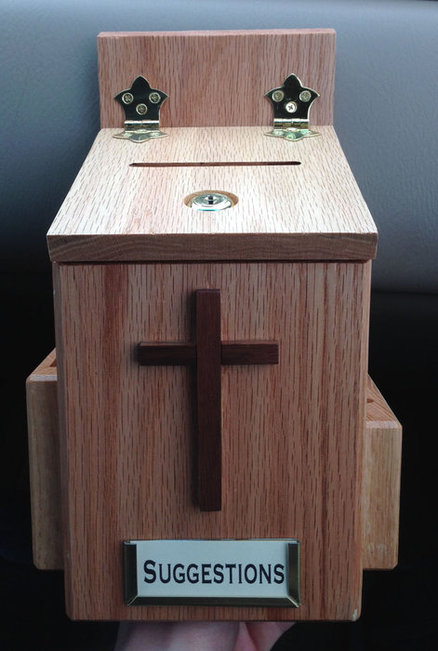Let’s say next week we put a ‘Suggestion Box’ at the back of the church, and you could write down whatever you think would make St. Anthony’s a better church. What would you write? Would you want different music, a shorter Mass? How about changing the priest, friendlier people, maybe a parking lot?
Let’s expand this question: If you could change anything about your family, what would it be? To make your marriage better, what would you change? And you can’t say your spouse. Finally, if you could change anything in your life, what would it be?
These are such beautiful questions because they tap into our desire for a better life. And most of us would change something outside of ourselves.
But we’re reminded from today’s Gospel that we should change ourselves. What defiles a person is not what happens to us, but what comes out of us. Jesus says, “Listen to me, all of you, and understand: there is nothing outside a person that by going in can defile them, but the things that come out of a person are what defile them. For it is from within, from the human heart, that evil intentions come: fornication, theft, murder, adultery, avarice, wickedness, deceit, licentiousness, envy, slander, pride, folly. All these evil things come from within, and they defile a person” (Mk 7:14-15,21-23).
We tend to think everyone else or something outside of ourselves is the problem. If, for example, we change things at Mass, then we’ll have a better experience. To a certain extent, that’s true. But for the spiritually mature, even if the homily or music are bad, Mass is always a spiritual experience. We say things like, “He makes me so angry,” but in reality, the anger is inside us. He’s just an occasion for our anger to come out. People who learn to control their anger don’t let their anger control them, no matter what happens to them. Same with our impatience: impatience is on the inside. Things just trigger it; people push our buttons. So part of the solution is to not have so many buttons. No one makes us lie, no one makes us swear, no one makes us unhappy. They just bring to the surface what’s already inside.
Matthew Kelly writes, “When I am spiritually healthy, nothing bothers me…. When I am spiritually healthy my wife can take forever to get ready, the stock market can drop a thousand points in a day, the flight can be canceled, my favorite team can lose, and my plans can fall apart, but I am able to remain calm and maintain a joyful outlook with a deep inner peace…. When I am not [spiritually healthy], even the smallest things drive me crazy. At those times I tend to be irritable, restless, and discontented. In fact, my attitude toward other drivers on the roads between my home and the office is a pretty good barometer of how healthy I am spiritually…. Someone around me at work or at home could do the smallest irritating thing and that will be enough to get me all twisted up inside. I may not lose it on the outside, but on the inside I am seething” (The Four Signs of a Dynamic Catholic, 41).
How many times have I heard some wives say to me, “Father, speak to my husband,” and then I go to the husband who tells me privately, “Father, tell her to leave me alone”? The other person’s always to blame, and we’re always pointing fingers at someone else. But remember, when you point your finger at someone, three fingers are pointing back at you (which is why I always point with all my fingers!)
Objection: what if we’re actually doing our part, and someone else is really the problem? Let’s say, for example, someone in our family has a drug addiction and it’s destroying us and our family. The answer is: we have to address it proactively, with prayer and by helping that person, and maybe by asking the person to leave the house. But God still calls us to grow too. We’re still sinners who have to grow in patience, courage, and hope. God asks us to address problems outside of ourselves, to talk to people about what they’re doing to us, but we should focus on growing too.
A priest once went to a new church and announced, “There are going to be some changes around here.” Then someone asked, “What about you, Father?” I thought that was a great response! I want a better parish, but it starts with changing myself. Yes, I as the pastor can and should use my role to improve things, and give better leadership and direction. But, after doing this, and improving myself, I can’t worry about what I can’t control. I can, for instance, encourage everyone to pray better, participate more, and be more friendly, but I won’t let it bother me if people don’t. This is such a great reminder for me and so freeing: I can only control myself.
Wouldn’t you like to have a joy that you could never lose no matter what happens? When we’re spiritually healthy nothing can take it away. What gives us joy isn’t outside us; it’s inside us.

